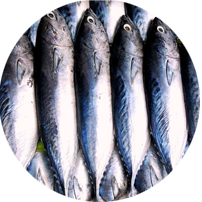How often do you go fishing? Never? Occasionally? Often? And which answer also matches how often you should eat fish? That’s right, it’s “often”! Most health organisations recommend at least 2 portions of fish a week, although there are different recommendations for pregnant/breastfeeding women and children.
Fish and shellfish provide us with protein, vitamins and minerals, all of which are essential for our health. And talking of essential, oily fish contain essential omega-3 fatty acids, and those are seriously important – there’s a reason they’re called “essential”!
So, what are omega-3s actually good for? Well, they are a type of fat that our bodies can’t produce on their own, and we really do need them. They’re a key part of our cell membranes, all throughout the body, which is why they’re important from heads, shoulders, knees and toes, knees and toes… Sorry, head to toe!
Just some of the areas that omega-3 fatty acids are good for are:
- Heart health, preventing heart disease and helping maintain normal heart rhythms
- Normalising cholesterol levels, lowering triglycerides, and lowering blood pressure
- Learning and development, and potentially reduction in ADHD symptoms
- Brain function – increasing growth of neurones in the frontal cortex, increasing circulation, and keeping your dopamine levels high
- Bone health and osteoporosis
- Autoimmune disorders
- Rheumatoid arthritis and joint pain
Although people take supplements of omega-3 fatty acids, scientists agree that consuming them through food is highly preferable. And oily fish is one of the best sources. So you can see why we’re encouraged to eat more fish in our diets.
What’s the catch? Well, we’re not talking about a trip to the fish and chip shop a couple of times a week, I’m afraid. Steamed, baked and grilled are the ways to go. White fish contains less omega-3 than oily fish in any case, so the chippie is really not the place to go. Also, tinned tuna has lost most of its omega-3 goodness, so a tuna sandwich just isn’t going to cut it.
So what’s the catch of the day? Oily fish are the ones to look out for – anchovies, mackerel, sardines, salmon, trout, herring and pilchards, for example. When it comes to tuna or swordfish, be a bit more wary as it can contain higher mercury levels so don’t have it more than once a week.
Time to “go fish” and have yourself a tasty, and amazingly nutritious fish supper.
Fiona Stephen is a nutritionist based in Barnet in Hertfordshire. Read some comments that her clients have said about her nutritional therapy or contact Fiona Stephen Nutrition to discuss your requirements.






